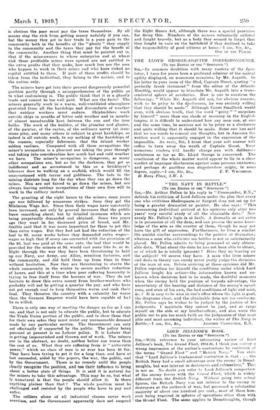"THE NAVY IN BATTLE."
(To THE Enna. Or THE SPECTATOR.") Soo,—Mr. Arthur Pollen in his reply to "Commander, R.N.," defends his criticism of Lord Jellieoe under the Idea that every one who criticizes Shakespeare or Sargent does not eat up for being a greater dramatist or painter. He also says "This unassuming individual arrived at his opinions only utter two years very careful study of all the obtainable data." Now surely Mr. Pollen's logio is at fault. A dramatic or art oritie is in possession of all the data, and can possess the Dallie know- ledge of the arts as the creator of them, though he may not have the gift of expression. Furthermore, ho lives a similar life amidst similar surroundings to the painter or dramatist; whereas a man who criticizes sea battles is not so satisfactorily placed. Mr. Pollen admits to being possessed of only obtain- able data. What about the data he has not been able to obtain, or of which he is totally ignorant Have they no bearing on the subject? Of course they have. A man who lives ashore end deals in theory can surely never justly judge tho decisions of the mum at sea. Before arriving at these opinions did Mr. Pollen reproduce for himself the conditions under which Lord Jellieoe fought his action—the information known and un- known when decisions had to be made, the doubtful moments when the enemy held the position of torpedo advantage, the uncertainty of the bearing and distance of the enemy's squad- rons, and moo of his own, the bad conditions of light and mist, Ac. ? It is easy to be wise in one's office whore the light is good, the diagrams clear, and the obtainable data not too confusing. Mr. Pollen says he wishes to be judged by the justice of his judgments. 1 maintain they cannot be just, and eo range myself on the side of my brother-officer, and also warn the public not to pin too much faith on the judgments of that most able and most assuming individual, the writer of The Nary in


































 Previous page
Previous page